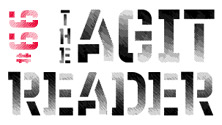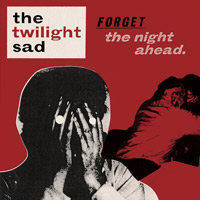
Forget the Night Ahead
FatCat
After even a few days in Scotland, beautiful as it is, it’s easy to see why, like no where else on earth, doom and gloom is inherent in the fabric of anything created within the kingdom’s boundaries. Just survey the bands from Glasgow alone to test this theory: the storm and stress of Mogwai, the decrepit pub mutterings of Arab Strap, and the loser-luck indie of Frightened Rabbit. Even Snow Patrol, for all their stadium-expanded vanilla sweetness, seem covered in a shroud of melancholy more often than not. If those bands wallow in certain aspects of the city’s scraggly, hungover temperament, than in the course of two albums, the Twilight Sad have sought to encompass the entirety of what it means to be Glaswegian.
Forget the Night Ahead, the band’s sophomore album, says it all in the record’s title, and with that intentional stance to live within the moment, they’ve bottled up the romantic notion of elegance through stoicism exuded throughout Glasgow’s darkly passionate streets. Of course to fully grasp the drama of Forget the Night Ahead, the listener will have to contend with the curt sophisticate of James Graham’s thick Scottish accent and the rest of his band’s penchant for a fairly glossy sonic sameness from beginning to end. Still once that sometimes impenetrable shell is breached, songs like first single “I Became a Prostitute” soar well below the ceiling of impending rainclouds, boiling in constant waves of mutilation, but never quite breaking through the thick veneer. There lies the struggle. “Interrupted” might meander as late-album filler, but is really a confident pop song displaying the Twilight Sad’s mass appeal, even with lines like “feed you to the dogs” revealing the ugly. Underneath the tidy, proper exterior of “Seven Years of Letters” tartan clashes of guitar maculate any hopes for mainstream salvation, and in reality, the quartet is all the better for such a tense and brooding backbone. While not exactly easy listening, especially given the second half’s spiral into desolation, Forget the Night Ahead is filled with a euphoric rush just smart enough not to show much joy.
Kevin J. Elliott
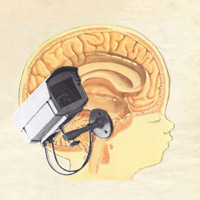
Origin: Orphan
Arts & Crafts
After a couple of albums wildly successful for their sense of theatrics and use of innuendo, 2006’s Awoo and, in particular, 2004’s Mississauga Goddam, the Hidden Cameras have seemingly scaled back their scope for their fourth and latest record, Origin: Orphan. Scaled back because the album seems neither as grand nor as manic as its predecessors, though songwriter Joel Gibb’s pop knack hasn’t dissipated in the least.
On “In the NA” the band comes close to repeating past glories, its syllabic refrain not unlike “I Want Another Enema” from Mississauga, though its keyboard squelch is more than a little more confectional than that record’s instrumentation. And while tracks like “He Falls to Me” and “Kingdom Come” also work within a similar MO as the Camera’s previous work, none utilize the same scale. Instead, Gibb seems content with using the tools of a traditional band, and it’s hard not be a little disappointed, as this makes the Hidden Cameras seem ordinary for the first time, and the simplistic “Underage” and “The Little Bit” somehow beneath them. But with the splendour found on songs like “Colour of Man,” Gibb’s pop charms eventually have their way, and the album, though smaller proportionately, turns out to be still big on kicks.
Stephen Slaybaugh

Eskimo Snow
Anticon
Why’s fantastic 2008 album, Alopecia, was perhaps the most successful marriage between hip-hop and indie rock since the Beta Band’s Hot Shots II. And I’m not talking about “indie rap,” as in the title sometimes bestowed upon acts like the inestimable Def Jux crew. No, Alopecia features tracks that would sound right at home on a Paste magazine mixtape, if not for lead singer Yoni Wolf’s intermittent rapping. If the sound of that makes you cringe, keep in mind that Wolf comes from a legitimate hip-hop background that includes a membership card with the Anticon Collective, as well as a stint with critically hailed group cLOUDDEAD.
Now, if you’re still not firing up your internet to download Wolf’s entire discography, then Eskimo Snow is probably the Why? record for you. On this impressive follow-up to Alopecia, the frontman eschews all of his predilections for hip-hop in favor of more conventional indie rock singing. Wolf possesses the agreeably nasal tones of They Might Be Giants’ John Flansburgh or Built to Spill’s Doug Martsch, with the former’s strange sense of humor and the latter’s capacity for doom and gloom. (This combination of both qualities is apparent in song titles like “Berkeley By Hearseback.”)
Meanwhile, Wolf’s lyrics are cryptic but not undecipherable. On “Against Me,” to illustrate the painful memory of a former lover who’s moved away, Wolf sings, “I see the rain does not respect state lines, why should you?” And later in the song, he sees “pissing boy fountain statues,” which cause him to imagine lightning striking water and traveling up his “piss stream,” as if to eradicate the need to spread his seed along with the frustration that accompanies those carnal desires. In this song and others, Wolf accomplishes the Herculean task of actually crafting a compelling stream-of-consciousness narrative, and not just listing random images that happen to sound cool together.
The songs on Eskimo Snow are outtakes from the Alopecia recording sessions. But as was the case with Radiohead’s Amnesiac in respect to Kid A, this collection of “lesser” tracks only stands as a testament to the brilliance of its predecessor. That Eskimo Snow is, in Wolf’s own words, “the least hip-hop thing (he’s) ever done” does make it less eclectic and varied than some of his previous work. But the hip-hop influence was never the most striking quality of Why’s albums. Rather, it’s Wolf’s troubled and idiosyncratic psyche that keeps us coming back, and here it is once again vibrantly rendered for the listener.
David Holmes
MP3: “The Blackest Purse”

Album
True Panther/Matador
Whether or not San Francisco’s Girls debut Album will be lauded as a generational watermark, or even one of 2009’s best, is truly besides the point (though both are certainly possibilities), simply because Girls, though cherry-picking through all that’s good and wholesome from the past five decades of power-pop music, exist in a ephemeral moment. Were Album time-capsuled and opened up in the year 2050, it would likely baffle scientists. But those alive who once found the songs of Christopher Brown magnetically endearing would likely faint from the whiff of nostalgia. Album is effortless music to say the least, of a particularly scene (San Francisco) and a particular season (summer), and that lack of trying too hard becomes universal enough to connect with anyone, at any time. All of Brown’s illusions to weed, women, and suntanned rock & roll seem to never relent, showing a band that rarely lacks in thematic focus even when the songwriting lacks substance.
If there’s eventually a trend of classic-sounding bands making classic-sounding, hi-fidelity music then Girls could likely be the spokespersons. With the grand and bloated schmaltz of Spiritualized on “Hellhole Ratrace” and the teen rebellion greaser’s shuffle of “Big Bad Motherfucker” among the prom ballads and surfing safaris that compose Album, Girls distance themselves from any bedroom-recorded contingent by stretching bridges with virtuosic chops and spacing out with arena-sized scope. While that may be a change of pace, the over-saturated, sweet and glossy, nearly huckster homogenous mock of pop (in all its forms) can get a bit too cheeky in large doses. Girls really prove their worth in singles. True, Album is sunny and weightless, a record to put on in the background and to forget about tomorrow. The real value of Girls comes in the awkward crevices of Brown’s writing. Be it the spectral campfire folk of “God Damned” or the soft-rock creep in “Headache,” combining these much darker moments with obsessing over jukebox glamour could very well be Girls’ golden ticket.
Kevin J. Elliott
MP3: “Lust for Life”
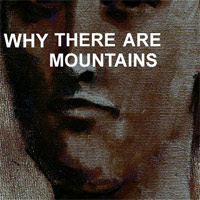
Why There Are Mountains
Sister’s Den
Cymbals Eat Guitars honcho Joseph Ferocious (a.k.a. Joseph D’Agostino) probably never thought he had anything in common with the middle Jonas brother. But they’re both 20 years old, grew up in New Jersey, and sing about girls and trees. The only real difference is that Joseph plays guitar. And writes his own songs. And routinely gets compared to Isaac Brock. And Stephen Malkmus. And embodies a poetic loose-cannonism that’s well beyond his years.
The band officially formed last winter, but Joseph and drummer Matt Miller played as a duo in high school covering their share of Weezer tunes. They found bassist Neil Berenholz on Craigslist, added Berklee-trained pianist Brian Hamilton, and began plowing through Brooklyn with moxie and 10 tons of reverb. After self-releasing their debut record, Why There Are Mountains, in January and distributing it to bloggers and radio stations, they got signed to Sister’s Den, who are re-releasing it.
Like a fast-moving storm, Cymbals Eat Guitars swirl through a gamut of stop-and-go distortion. You’re not exactly sure when you’ll get pummeled with big guitars and fast drums or when you’ll be cradled with placid keys and bass. Through each of the album’s nine rhapsodies, Joseph spews messages about death and consumerism with the persuasion of a shaman twice his age. He’s ginger, and he’s chaotic. “Some Trees” and “Cold Spring” are brilliantly aggressive and unpredictable, while the cerebral “Indiana” breathes rich moments of indie gallantry. Joseph borders on a little too much screech and grate in slower attempts like “Share” and “Wind Phoenix.” But it’s easier to lose yourself in the fitful trance of his natural mania than try to suffocate him with parameters.
Alexandra Kelley
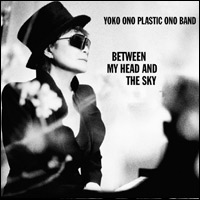
Between My Head and the Sky
Chimera
It seems fitting that Yoko Ono’s latest record arrives during the month that bears witness to this decade’s regularly scheduled Beatlemania infusion. It’s been hard to get away from the machina thrusting the newly remastered Beatles catalog and the foursome’s accompanying Rock Band incarnation upon a new generation of potential fans. But while everyone’s ears are turned backward toward the work of the Beatles, Yoko and her reconstituted Plastic Ono Band have delivered Between My Head and the Sky, a full-length album decidedly rooted in the now.
Much like the 76-year-old Yoko, Between My Head and the Sky seems to dabble in a bit of everything. Nevertheless, the record still feels cohesive even as it crisscrosses genres. The album begins in particularly feisty fashion with “Waiting for the D Train,” an uptempo garage rocker that mixes snippets of Yoko’s distinctive wail with a rumbling, driving bass line and frenetic guitars. The fully electronic “The Sun Is Down” follows a totally different path, calling to mind a poetry reading backed by Kraftwerk. “Ask The Elephant” and “Memory Of Footsteps,” meanwhile, demonstrate the jazz sound that fills in a substantial portion of the album, the former showcasing Yoko’s playful, childlike side, while the latter provides a wistful counterpoint in the guise of a piano lounge number. The album is perhaps most predictable lyrically, where Yoko takes on common themes of peace and love from a contemporary perspective, but provides some balance with intimate reflections on her own life and experiences.
The record reaches its greatest heights when the genres blend together, as evidenced in the title track, which combines the rock, electronic and jazz elements, along with Yoko’s experimental tendencies. The urgency and tension of the instrumental track build throughout the song, fitting well with Yoko’s aggressive vocal and lyrics, something for which the new Plastic Ono Band—most notably comprised of Sean Lennon, Cornelius and Yuka Honda of Cibo Matto—deserves credit. This inter-generational collaboration highlights the importance and lasting nature of Yoko’s musical endeavors. In a world that loves nostalgia, Between My Head and the Sky underscores the need to re-evaluate the Yoko Ono catalog, and it shows that while there’s been a lot of great music made in the past, good stuff is still happening if you take the time to look around.
Ron Wadlinger
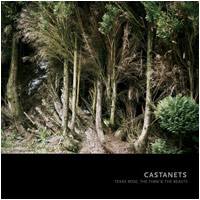
Texas Rose, the Thaw & the Beasts
Asthmatic Kitty
Castanets a band named for strange little percussion instrument, though oddly enough, the percussion on their latest release, Texas Rose, the Thaw & the Beasts, is actually quite minimalist, aside from the occasional pitter-patter of drums, handclaps and crashing of cymbals.
The brainchild of Ray Raposa, who also happens to be the band’s only consistent member, the band is known for their experimental approach to a traditional folk sound. They were a small part of the initial (and pardon my subsequent usage of this oft-overused term) “freak folk” movement a few years ago, and their records have gradually evolved since. Unfortunately, though, that once-quirky folk they used to play has morphed into an excruciatingly slow and defiantly minimalist take on country music.
Though the marriage of ambience and folk may seem strange, it’s the formula that made Castanets so unique and lovable in the first place. Texas Rose begins with a drab and depressing ballad called “Rose,” then meanders through some synth-laden tracks, like “Lucky Old Moon,” where those electronic soundscapes are juxtaposed with Raposa’s gruff southern twang, but returns to its country roots by the end.
Unfortunately, the downfall of this album is that it doesn’t quite peak, or pick up at all, really. The album in its entirety sounds like one, unbearably long 40-minute traipse through a barren landscape. With the modest approach to percussion, the tempo remains much the same throughout, as do Raposa’s Dylan-esque vocals. Sure, the instrumentation is audacious, but after a handful of hard-to-differentiate songs, something has to give. Fittingly, Texas Rose ends much the way it begins: slowly and with very little fanfare.
Jennifer Farmer
MP3: “Worn from the Fight (with Fireworks)”
ALBUM REVIEWS
A Sunny Day in Glasgow, Ashes Grammar
Simian Mobile Disco, Temporary Pleasure
The Hi-Nobles, Shake
Grand Archives, Keep in Mind Frankenstein
Manic Street Preachers, Journal for Plague Lovers
Amy Millan, Masters of the Burial
Yo La Tengo, Popular Songs
Vivian Girls, Everything Goes Wrong
Os Mutantes, Haih or Amortecedor
Wild Beasts, Two Dancers
HEALTH, Get Color
Monotonix, Where Were You When It Happened?
Drive-By Truckers, The Fine Print
The Clean, Mister Pop
